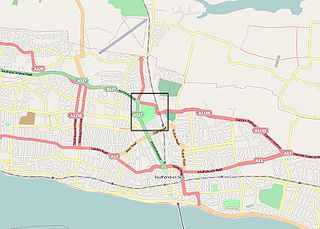
Camp Bling
Encyclopedia

Road protest (UK)
Road protest in the United Kingdom usually occurs as a reaction to a stated intention by the empowered authorities to build a new road, or to modify an existing road. Protests may also be made by those wishing to see new roads built or improvements made to existing roads. Motivations for protests...
camp was set up in Southend-on-Sea
Southend-on-Sea
Southend-on-Sea is a unitary authority area, town, and seaside resort in Essex, England. The district has Borough status, and comprises the towns of Chalkwell, Eastwood, Leigh-on-Sea, North Shoebury, Prittlewell, Shoeburyness, Southchurch, Thorpe Bay, and Westcliff-on-Sea. The district is situated...
in Essex during September 2005 to obstruct a £25m plan to widen the Priory Crescent section of the A1159 road
A1159 road
The A1159 road is a short road skirting the north of Southend-on-Sea from Prittlewell to Southchurch, in Essex, England.-A127/A1159 Cuckoo Corner & Priory Crescent:...
over the Royal Saxon tomb in Prittlewell
Royal saxon tomb in Prittlewell
The Royal Saxon tomb in Prittlewell is a high-status Anglo-Saxon tomb excavated at Prittlewell, north of Southend-on-Sea, in the English county of Essex....
. In April 2009 the authority announced that plans to build the road had been abandoned and the camp was disbanded in July 2009.
History

The road would have resulted in the felling of 111 trees and a loss of 300 square metres (358.8 sq yd) of public green space. 20,000 signatories completed petitions against the road.
Of those responding to the official Winter 2001 Civic News survey, only 16 people were in favour of the proposals from a delivery area covering all Southend households.
At a meeting with the council on the 23 April 2009 the authority told the protesters that the road widening scheme had been abandoned and the protesters agreed to leave within 3 months.
The camp
The camp is situated between a main road and a railway line. The site consists of a large communal area, a visitors centre and several personal dwellings. All buildings are made from re-cycled materials. The communal area features seating, heating and a bookcase. The buildings are heated by wood burning fires and run off donated wood. Water is collected on a daily basis. Food is cooked on a calor gas oven and there is a composting toiletComposting toilet
A composting toilet is a dry toilet that using a predominantly aerobic processing system that treats excreta, typically with no water or small volumes of flush water, via composting or managed aerobic decomposition...
. A wind generator provides the evening lighting.

